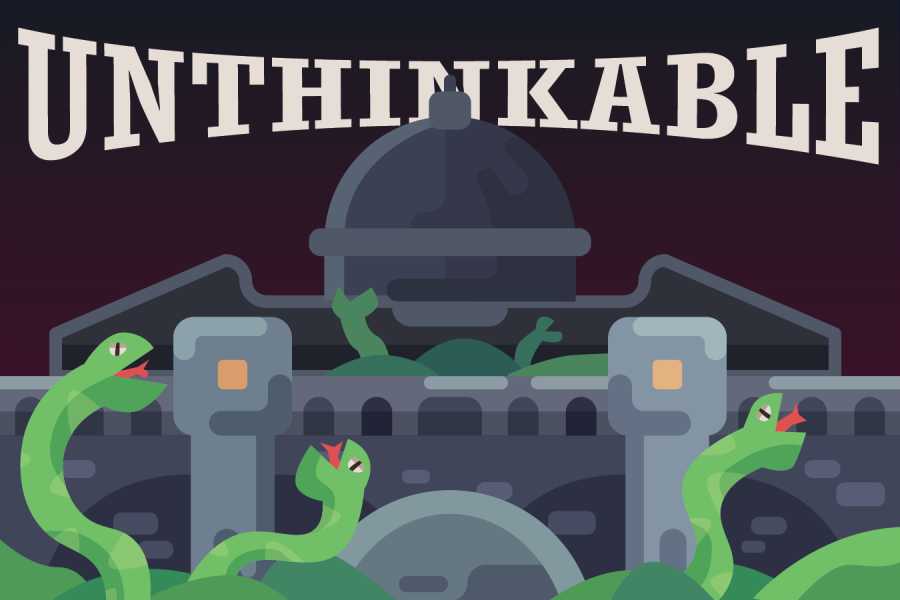In Jamie Raskin’s “Unthinkable,” a love letter to his son and to democracy
Congressman Jamie Raskin’s recent book is no ordinary political memoir; it’s a tribute to his late son and to democracy.
January 29, 2022
In February of 2021, pundits estimated that former President Donald Trump’s second impeachment trial would end in a 53–47 vote, 14 senators shy of conviction. It was a number more promising than a 50–50 split along sharp party lines, the experts agreed, but the president’s acquittal still seemed inevitable. Yet as Senate President Pro Tempore Patrick Leahy called forth his colleagues to vote on whether Trump had incited the insurrection at the U.S. Capitol on January 6, Congressman Jamie Raskin could still see the possibility of a 100–0 result in favor of conviction.
Raskin’s relentless optimism becomes clear in his latest book, “Unthinkable: Trauma, Truth, and the Trials of American Democracy,” which chronicles the dual tragedies congressman dealt with in 2021.
On the final day of 2020, Raskin lost his 25-year-old son, Tommy, to suicide. Barely a week later, on January 6, came the insurrection in the U.S. Capitol, Raskin’s revered workplace. Raskin’s work in the ensuing months focused on Trump’s second impeachment trial, of which the Maryland congressman was the lead manager.
Though Raskin is a politician, “Unthinkable” is not a political memoir. Rather, it’s the tale of Raskin’s son, whose dedication to animal rights, advocacy for pacifism and “daily ethical zeal for the truth and social fairness” endeared him to family, friends and professors — especially at Harvard Law School, where Tommy was a student. Tommy is the current that runs throughout the novel, from when he introduced his father on the family’s front porch during his first state senate race in 2006, to when he later gives input on proposals that Raskin runs through Congress. It was the unyielding support of Tommy and the rest of his family, Raskin writes, that allowed him to navigate the insurrection, which seemed far-fetched even for Trumpian America.
The fact that “Unthinkable” is well-written isn’t a surprise to anyone who knows anything about Raskin’s background; Raskin is a state senator-turned-congressional representative, a Harvard law graduate and a former professor of constitutional law. None of these accolades or positions, however, automatically translate to raw, emotional vulnerability on pages.
Here, Raskin’s language is powerful for its duality: his words that are specific to his life experiences, yet reflect the larger narratives that many Americans have faced since Trump took office in January of 2017. There are the heartbreaking details of Tommy’s last days, oozing with survivor’s guilt — both Raskin’s, and that of others who have lost loved ones to mental health struggles or the coronavirus. There are the heart-pounding descriptions, thick with fear, as the congressman watched his colleagues barricade Capitol doors and strap on gas masks — for those still attempting to grasp the hours during which seditionists threatened our democracy.
There are still the sharply-written paragraphs, outlined in lawyer-like precision, about ethics, political “impossibilities” and the merits of progressive policy. This is the work of an elected official, after all. But when descriptions of constitutional precedent and takedowns of Republican arguments feel excessive — which they rarely do — Raskin never loses sight of the “moral center,” as he would describe it, of the story: Tommy. His focus on his son is not a self-serving, triumphant political dramatization, but instead a representation of the values that Tommy embodied. Throughout the book, his presence follows Raskin everywhere, from conversations with Speaker Nancy Pelosi to arguments he gave at the impeachment trial. To Tommy, the purpose of democracy was to stop violence — Raskin imagines Tommy’s horrified reaction to the events of January 6, which strengthened his resolve.
At one point in “Unthinkable,” Raskin recalls the first interview he participated in after the insurrection. CNN’s Jake Tapper asked Raskin how he was able to navigate the tragic start to his year. The congressman responded, as always, with a fighting and resilient spirit.
“I’m not going to lose my son at the end of 2020 and lose my country, my Republic, in 2021,” he said. “It’s not going to happen.”
It’s a resolution that still carries weight. The book’s core messages are timely in a period when the January 6 select committee, of which Raskin is a member, continues to investigate Trump’s willful dereliction of duty, despite Republican congressmen’s false claims of illegitimacy. Indeed, this book is one that will remain valuable in understanding not only the politics of this time but the humanity of it.
The book is a reminder of the many affected by that day: the Capitol police officers, the congressmen, the American people. It’s a remembrance of Tommy, and an extended hand to those dealing with mental illness. It’s a celebration of family, of core constitutional values and of the morals which bind us to each other and to this country.
Raskin’s memoir calls for Americans to challenge the “unthinkable” aspects of life — no matter how daunting they may be.
Tara Davoodi was a fellow in Raskin’s Democracy Summer program.










